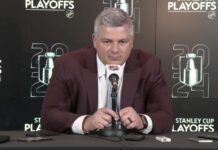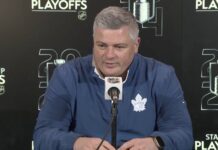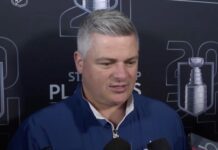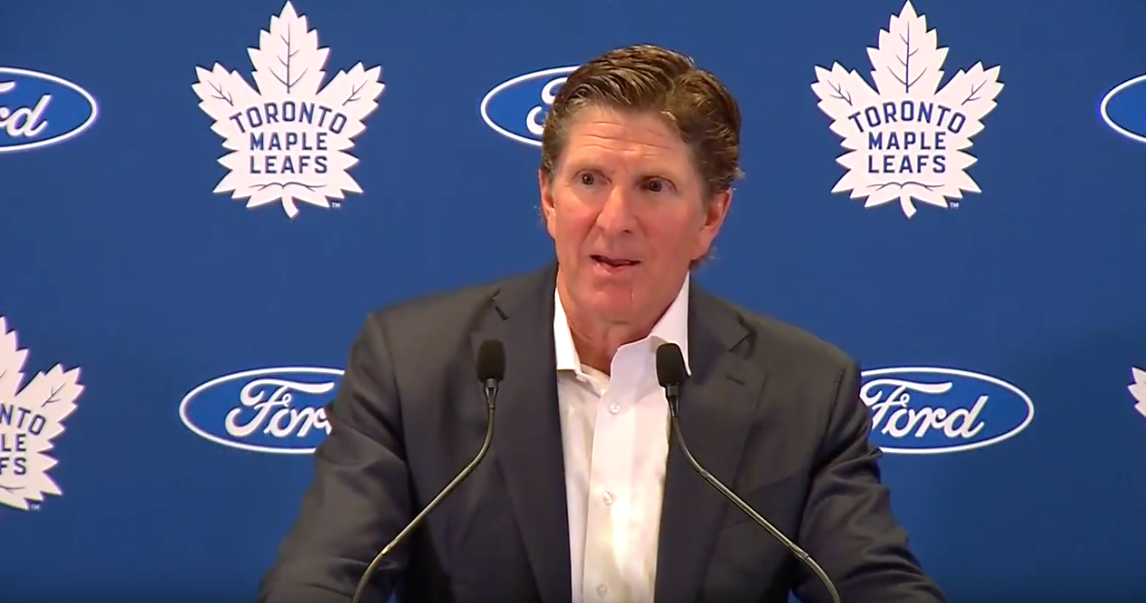Mike Babcock joined TSN Overdrive on Monday evening, discussing the expectations for the season, the decision to waive Curtis McElhinney and moved ahead with Garret Sparks, how he is going to deploy his lines after power plays, the power play itself, and much more.
You’ve been here a number of years now. It feels like the city is more abuzz than years in the past. How would you compare the anticipation for this season compared to others here in Toronto?
Babcock: I agree with you. This is my fourth season. Our first one, we ran it into the ground. We had some things to fix. The next year, we made the playoffs and I don’t think anybody expected that. Last year, we hoped to make the playoffs and we did and set a franchise record for points. I don’t know if you can do that every year, but in the end, I think what you want is to build a program that can have a good run; an opportunity year after year to win. I think that gives you a chance.
If you’re just a one and done team, the chances of winning are very slim. When you build a program and you have good contracts and you have young people and you have good veterans, you have a chance to continually get better so you can learn how to win in the end. We’ve learned how to win in the regular season. We haven’t learned how to play heavy enough and hard enough and compete hard enough [to win in the playoffs].
You mentioned in the preseason that you have to learn to play in your own end and compete. How do you fix that? It’s the same personnel and kind of the same guys going out there. When you say, “We’ve got to learn how to play in our own end,” how do you do that?
Babcock: You do that by going through it. Disappointment leads to fixing things. Anybody who finished the year and didn’t go home and go to work, obviously, you didn’t get it. But I think a lot of that happened here this summer.
The other thing that happened to us – last year, we got Marleau to come, which is fantastic. By adding him and our team growing, we had enough good players to get John to come. What John does is gives us a player who has been through it a number of times. When you’ve been through it and you haven’t had the success that you want, you’ve got some battle scars on you.
Our young guys have come and the team is good. They haven’t been through it as many times. Having those guys around to help you, to talk to you, to tell you how hard it is going to be, I think is real important. As a coach, you can do a lot of things, but you can’t be at the back of the plane or the team bus or at team dinners. You just can’t be. That is where a lot of the work gets done and we’ve got key people to help us do that.
You mentioned John Tavares signing here. As a coach, when you land a guy like that – who is a superstar and a guy you know is going to be at the top of the lineup and bring a lot of success individually to your team – is there any anxiety that comes with that based on multiple options, the expectations going through the roof? What is like as a coach when you land a guy like that?
Babcock: Obviously, I had Johnny in the Olympics and had him again at the World Cup. We had talked about it a number of times: This is when our team would be ready. We knew that when Stamkos was available, it was a hope thing. We weren’t ready for him. We’re ready now. This guy is from Toronto. To me, it was a natural fit.
You never know for sure that he is going to decide to come your way. You don’t know that. John being the hockey junkie he is and the kind of professional he is, I think he is a perfect fit for our group. The players he gets to play with when he plays with us, I think, are perfect for him as well to help him be the best he can possibly be.
We like our situation. We think we’ve improved our club. Now we’ve got to show it, though. You show it by getting off to a good start. This first five-game segment for us is important.
You said you were talking to Tavares back at the Olympics. Were you talking about signing him long-term with the Leafs?
Babcock: No, I talked to Tavares at the Olympics because I was coaching him. You’re not allowed to do those kind of things, so I would never do that.
You knew you would be ready at this point. That was before you won the lottery with Matthews. Was that just because you believed in Shanahan and company and that this was going to work out? You were pretty convinced that if it got to the point where he was available and you were good enough, you could sign him?
Babcock: There is no question about that. I think I said when I first arrived here that there are so many guys from Ontario in the NHL. I still believe we are going to get a lot more guys to come home. Now, are they going to be these big contracts? No, they can’t be anymore. But they can sure be veterans at the end that help push you over the top.
When you make the situation good enough, when you get really good players, players recruit the other players. We’ve talked about all of the other things – great city, unbelievable franchise, all of that kind of stuff – but you need great players. Guys don’t want to play with bad players. They want to play with good players that protect them.
You were talking in your scrum about Curtis McElhinney and what he brought to the table for you since coming over. Garret Sparks makes the team. Do you want to elaborate just a bit on some of the tough decisions that were made?
Babcock: These are all good people and good men. These veteran guys – you don’t stay in the game unless you’re a good human being. Mac is as good as they come. He did everything right. He gave us an opportunity every night last year. These are hard, hard decisions.
Connor Carrick won our fitness tests, did everything in the offseason to set himself up for success. He’s the kind of person you want to be around.
Making decisions on this kind of people is very, very difficult. In the end, what you do is gather the information that is presented long term and short term and try to make the right decisions for your hockey club.
Sparks – we based it on what he did over a period of time here. Obviously, he’s got size, athletic ability. He was the American league goalie of the year. He won the Calder Cup. There is upside there and opportunity there.
I am not taking anything away from Mac. To me, Mac is an outstanding citizen. He’s got two young kids. He is a good, good man. This is a tough, tough decision for him and his family today and not an easy one to make.
In terms of the business side of that, the team would hope he clears waivers so he stays in the organization. But you just said a lot about his character and he is a veteran guy. Any conflicting emotions from your end? In a way, do you hope he gets claimed so he stays in the NHL?
Babcock: I thought it was clear for Carrick today, with the deal with Carrick, being the seventh and eighth guy with the Leafs again wasn’t going to be a positive situation for him. I think you have to look after people, too. Same for Mac. If Mac gets an opportunity in the NHL, he is an NHL goaltender and an NHL competitor. He is a great pro and a good person. I am pulling for Mac.
We know that, in the hard cap era, the salary cap is a constant part of the conversation and the debate. We talk about it all the time on this show. As a coach, how does that affect how you have conversations with Kyle? Can you just walk up and say, “I want this guy?” Or, is it, “Here is why I want this guy, but also because of the cap ramifications, here is how it might factor into the overall conversation?” How often does the cap come up with you?
Babcock: [Brandon Pridham] is our cap guy so we are talking about this stuff all the time. The business is the business. When you sit down at your kitchen table and there is a rhubarb pie there and one of you takes half the pie, there is half left for the rest of us. That is just how it goes. We all understand that. What we have to do is treat the players as fairly as possible.
I really like what Tavares did. He came here and took way less to come here. That’s what we tried to do with all of our guys in Detroit – we tried to get them to take less so we could continue to win on a nightly basis and have championship opportunity. If you don’t do that, you can’t win at the end. You run out of money and you can’t have enough depth. Right now, we are set up real well, I believe, to have a real five-year run here. We’ve got to do a good job with the cap and our signings, without any question. We will. We will be able to keep our group together and give ourselves a chance and grow into the team we want to be.
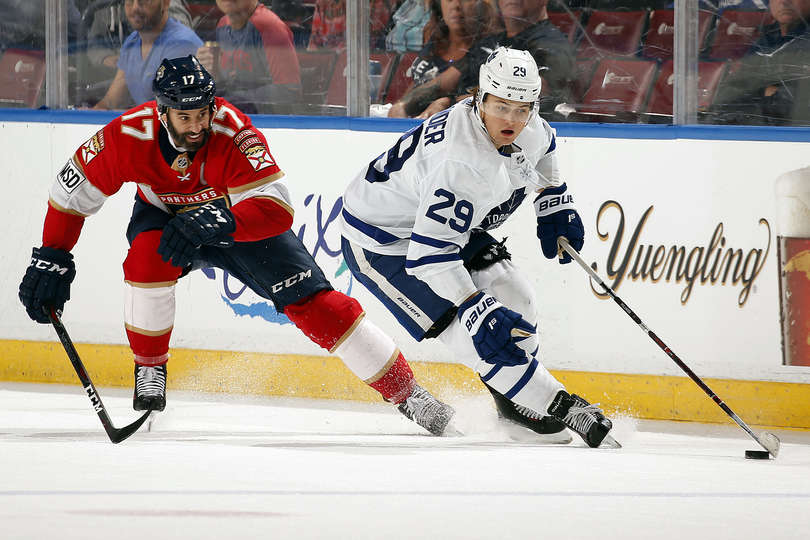
That’s a segue into William Nylander and his situation. There are contract talks ongoing. The season starts Wednesday night. Looking back on camp, without him here, how did you adjust camp? How did that factor into the way you played out the preseason?
Babcock: What I tried to do is put everyone in their real spot. What I mean by that is I planned on Willy being in the lineup. But we gave Leivo and Ennis an unbelievable opportunity that they might not have got. They might have shared that opportunity with Naz instead of both getting a real good opportunity. By doing so, it is way easier. Anybody who has played will tell you when you’re not sure and spend too much thinking, you don’t play as good. When you are on a line every day and you know where you’re at, you get a chance for your skill to come out.
I thought Leivs had one of his best games at the end. I thought Ennis was good as well. He got to play on a good line and he provided some good speed and made some good plays on it. To me, that works out fine.
I am not trying to say anybody replaces Willy. We’d love to have Willy back. There are ongoing negotiations, obviously, between his side and our side. They’ll find a way to get it worked out.
One of the things about your power play is that your three centermen are on the same power play. As the opposition coach, he might be thinking, “Sidney Crosby, you’re going out there after the power play because they’re without their 1-2-3 centermen.” How are you going to juggle that?
Babcock: The next shift is the real easy one. I don’t have to think. Lindholm is going. He’ll be going out there with Brown and Kapanen. The reason he will be is because that is who is left, but they are more than capable of playing against anybody in the league. That is not the issue, though. The issue is: How do you get them back on the ice fast enough so everybody has rhythm?
What I did is I had the guys monitor that. The numbers guys did a real good job of monitoring that and giving me back the feedback of what I did and how I handled it. I am going to just try to get better and better at it so we can keep rhythm on our bench. I think that is important.
The power play — what people miss out on is that it is not one minute long. It is two minutes long. When your big group milks their shift, they don’t score as much. When your second group doesn’t put any pressure on your first group, that makes it real hard. What we had last year is we had pressure – from both groups. That is what we have to have this year.
I was real excited the other day when the second group scored twice. The first group went out and didn’t execute on the entries or the breakouts. The second group came out and jammed it in the back of the net. To me, that is what it is about. The way I handle my bench is that, the next power play that comes, there is no question. Everyone can stand up and stretch all they want. If you scored, you’re going out next. It is just that simple for me.
You mentioned the team learning to play in the regular season and then elevate in the playoffs and become a little bit hardened and tough to play against. You’ve got a bit of a different roster and you don’t have guys like Polak and Komarov and Martin, who can be more physical in certain situations. Is that something that will be an ongoing process for your group? Your group looks different than it did six months ago.
Babcock: You’re right about that. It does look different. In saying that, is there ever going to be changes? There might be. What we’ve got to do is – being heavy and being competitive can happen by everyone. Zaitsev separates anybody better… he is our best D at shutting it down in the d-zone by far. He initiates more breakouts — not with a pass, but with a finished check and the puck stops there and the center gets it – than anybody on our team. He is one of our smaller D-men. You have to learn to use your body, offensively and defensively, to play heavy and have the puck.
The other thing that I think happens is that the battle-scarred teams – the teams that have been through it and had disappointment – find a way to dig in harder and longer. All you’ve got to do is look at Washington last year. But a little disappointment leads to that and I think you learn from that.
As much as we talk about getting ready for last year in the playoffs – if you remember, we were in easily – we weren’t ready for the first two games. We weren’t ready to play hard enough. Boston had it all on the line with Tampa. In the end, they were not ready to outdo Tampa for that first spot and ended up playing us. We end up playing them and they are more battle ready than we are. I think you’ve got to go through that stuff. I just do.
In my experience in the league, in coaching lots of good teams, a little battle scar won’t hurt anybody. That is just part of the process. The games that I coached in Detroit, over a period of time, it didn’t matter what you did in the regular season. If you didn’t do it in the playoffs, you were a failure. At the start when I came here, you had to get in. You still have to get in because the league is way tighter than it used to be, but the people in this community want us to be successful at playoff time and I don’t blame them.
The expectation should be high because the opportunity is good. In life, you want expectation. You want the pressure of expectation. Otherwise, you have no chance. I rather have a chance any day.
You have been around a long time. That is just a fact. You’ve been around a long time.
Babcock: I feel like I just started, man. Holy jumpin’.
You’re old. That’s a fact. You’re old.
Babcock: 55! I feel like I’m 25. What do you need?
You’re 55. The players are different. Scotty Bowman had his way of doing things. Different coaches had different ways of doing things. Have you had to alter or change dealing with these younger players? They’re different. Just dealing with them, is it different? They always say, “Why are we doing this? Why this? Why that?” You’re a great coach. You’ve coached the greatest teams. You’ve won the Olympics. You’ve won the Stanley Cup. How is it different? Do you think you have to change?
Babcock: I think you have to change every year. I think you have to reinvent yourself. I really believe, as a head coach in the national league, basically, you are busy until July 5th. Wherever they send you, they send you. Whoever you are recruiting, you are recruiting. Free agency ends. And then from July 5th to when you start, it’s the time to reinvent yourself.
The greatest thing about it is my kids are 25, 23 and 21. I know what those people are thinking. In saying that, the people on the team already have a dad. They don’t want another dad. Actually, one of my kids made that point.
The other thing is that we try to do is hire young people – young people keep us current. That is what pro athletes do. To think what you did last year is going to work this year – that is just not the case. In any industry, it is changing all the time. You’re always looking to hire change people with good ideas.
When I worked for Disney for five years with the Ducks and the Cincinnati Ducks, they had these things called the Disney imagineers. Their job was to think ten years out. What is coming next? I think you’ve got to be the same in our business. If you want to be current in our business, you have to be like that.
Scotty Bowman, in my opinion, was one of the greatest lifelong learners of all time. Always was changing. Always was looking for what is next. That is what we try to do here. We try to gather information and meet people and read and get outside our own network and go to different businesses to meet different CEOs and gather information. In the end, you have an opportunity to change.


